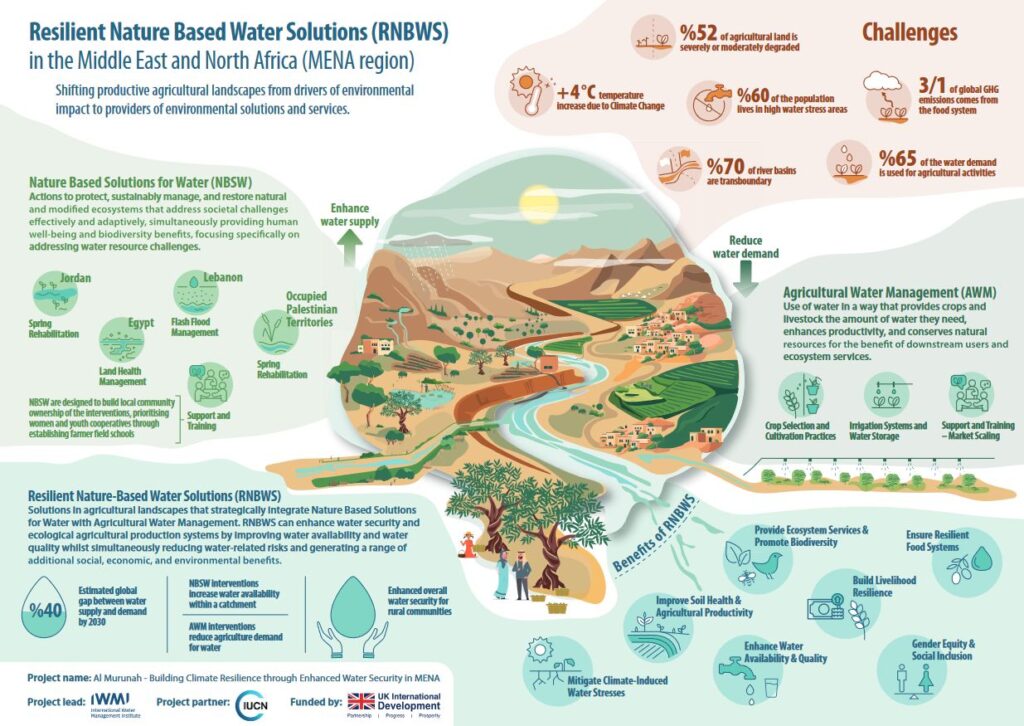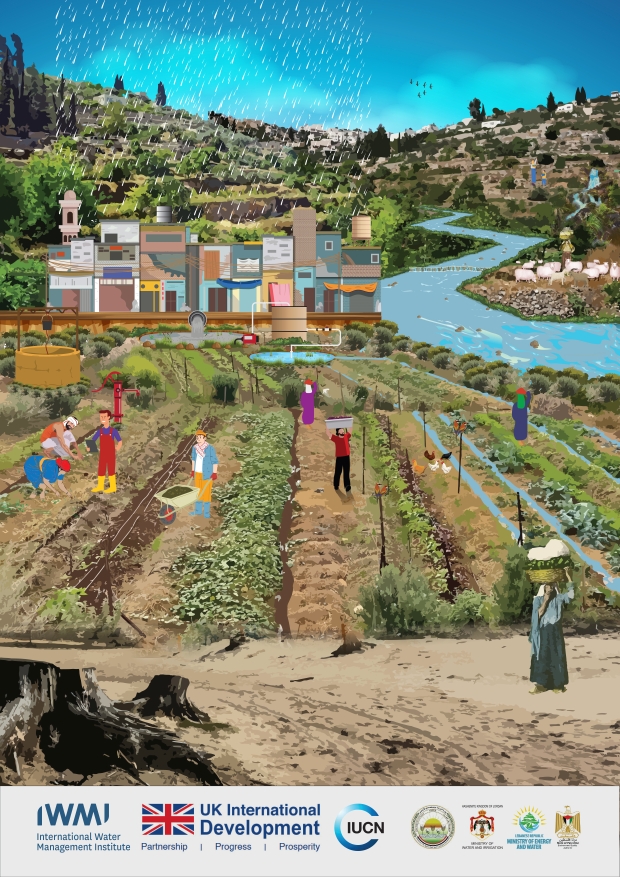Al Murunah
Al Murunah is a five-year project funded by the UK Government that IWMI implements in partnership with IUCN. It aims to enhance water security in Egypt, Jordan, Lebanon, and Palestine by integrating nature-based solutions for water and agricultural water management. The project’s approach emphasizes piloting integrated and scalable interventions, community empowerment focusing on women and youth, and stakeholder capacity development. The project technical brief is available in English and Arabic ( باللغة العربية).
Project Overview
Context
The MENA region is the world’s most water-scarce. Surface and groundwater resources, shared across borders, are under pressure due to increasing demand and climate change. Agriculture is the primary water user, accounting for around 65% or more of total water demand. Unsustainable land management practices, such as mechanized mono-agriculture and overgrazing, have resulted in land degradation and reduced soil water retention. Climate change exacerbates these issues by increasing temperature and, therefore, water demand, the frequency of droughts and floods, and decreasing precipitation.
Project Objectives
The primary objective of Al Murunah (‘flexibility’ in Arabic) is to increase water security and support climate change adaptation in the MENA region by integrating nature-based solutions for water and agricultural water management. These integrated interventions, which Al Murunah calls resilient nature-based water solutions (RNBWS), are coupled with social and market mechanisms to support sustainability and transferability.
The central premise of Al Murunah is that appropriately and collaboratively designed RNBWS can enhance water and food security in agricultural areas of MENA, thereby increasing the resilience of rural households and communities. Broadly speaking, RNBWS can enhance water availability (including via improvements in quality) and reduce agricultural water demand or otherwise increase its productivity. Simultaneously, they can support sustainable management of watersheds and agro-ecosystems to benefit human well-being and biodiversity.

RNBWS graph English version | Arabic version | French version
Project Activities and RNBWS Pilots
Al Murunah will meet its objectives primarily through participatory implementation of an RNBWS pilot project in each country. The pilots are proofs of concept for the RNBWS interventions. Also, through the implementation of pilots, Al Murunah will:
- Build community and national stakeholders’ capacity to adopt RNBWS more widely; and
- support national level planning and upscaling proposals.
Pilots will be undertaken in:

- Izbat Al-Hamra (Abu Al-Matamir District, Beheira Governorate), Egypt.
Izbat Al-Hamra, home to 25,000 residents, is located 25 kilometers inland from Alexandria in the Beheira governorate, a historical food production center in the Nile Delta’s western part. The governorate is especially famous for its artichoke production, a profitable crop that requires sufficiently abundant water of decent quality, as found near the head of Izbat Al-Hamra’s main canal. The farmers from Izbat Al-Hamra who operate on lands further down the tertiary canals suffer from water supply interruptions for up to 20 days a month and increased soil salinity, which greatly affects crop productivity and limits crop choices. To improve crop productivity and incomes, the project will introduce salinity and drought-resistant crop varieties, follow an agroecological approach based on crop diversity and rotation, and introduce solar-powered irrigation. Further, it will support women-led value chains and access to finance, as well as valorize farm byproducts.
- Wadi Al-Seer (Greater Amman Municipality), Jordan.
Wadi Al-Seer, a neighbourhood west of Amman famous for its natural springs, suffers from water shortages, pollution, and low agricultural productivity. To improve water supplies, Al Murunah plans to rehabilitate some of the area’s damaged springs and irrigation canal networks. Also, the project will work with a local women-run organization and revive the cultivation of prized terroir crops like the Roman olive and blue fig, which are well-suited to the area’s conditions, including through establishing a demonstration farm that includes greenhouse and open field cultivations.

- Ras Baalbeck and Qa’a (Baalbek-Hermel Governorate), Lebanon.
Ras Baalbek and Qa’a are villages in the northeast Bekaa Valley of Lebanon. The RNBWS interventions aim to address the challenge of flash floods. Over the past decade, violent flash floods have occurred more often during the cold season, destroying vital water infrastructure and homes and scraping off arable lands’ precious topsoil. Al Murunah will rehabilitate damaged flood management structures like gabions and check dams, and support groundwater recharge through diversion canals. The pilot also includes development of a demonstration farm that will introduce suitable heat and drought-tolerant crops of high market value and incorporate efficient irrigation systems. These crops will be integrated into the existing value chain of the local women’s cooperative to increase local incomes. Finally, Al Murunah will develop an afforestation plan for consideration in future scaling efforts.
- Wadi Al-Fara’a (Tubas Governorate), Palestine.
The upper catchment of Wadi Al-Fari’a is in the Tubas Governorate of the West Bank. It has three communities – Wadi Al-Fari’a, Ras Al-Fari’a, and Fari’a Refugee Camp – and a land area of 12,000 dunams, of which 337 is built-up and 10,500 are agricultural. Water scarcity – especially due to declines in springs’ productivity – and pollution from wastewater discharges are the main challenges experienced by farmers in the area. To address these issues, Al Murunah will rehabilitate the Fari’a Spring, restore canals, and develop an agrobiodiversity garden near the spring to promote cultivation and preservation of local varieties of indigenous species.
Engagement and Learning
Al Murunah has a National Project Advisory Committee in each country to advise on pilot implementation and support wider uptake of RNBWS. Members include representatives from ministries of water, agriculture, and environment, gender experts, and non-governmental organizations. In addition, we are engaging extensively with local stakeholders in each pilot community, with an intentional focus on women and youth and organizations in which they have prominent roles. Local and national stakeholders decided upon the pilot interventions through a collaborative and structured options generation and decision-making process.
The RNBWS pilots will generate practical examples in each country, and learnings will be exchanged regionally. They will generate evidence and understanding of the contributions that RNBWS can make to improve water security and livelihoods. This will include evidence of their market viability and financial returns to support market-led scaling of the innovations.
Countries
Egypt, Jordan, Lebanon, and Palestine
IWMI Project Team
Dr. Vidhisha Samarasekara
Strategic Program Director – Water Climate Change and Resilience
Project Director
Stephen Fragaszy
International Researcher – Water Climate Change and Resilience
Project Lead
Dr. Wasudha Abeyrathna
Project Coordinator




